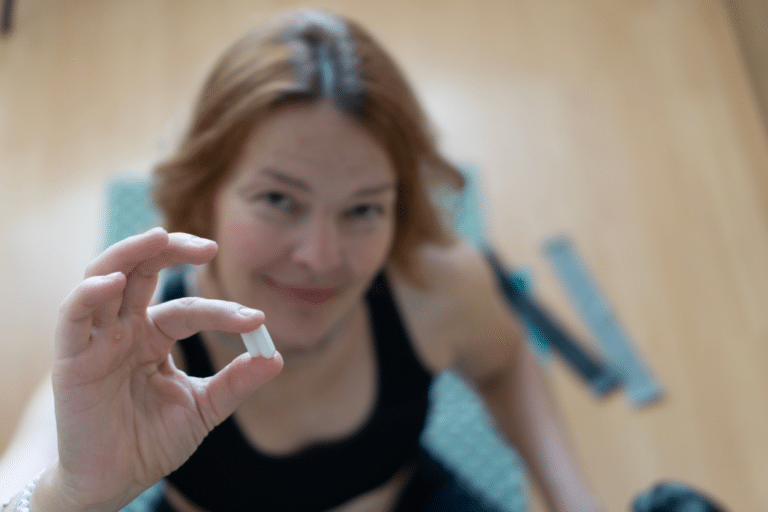Midlife women are the ultimate jugglers. Between work, family, volunteer opportunities, etc, it’s no wonder we all feel like our heads are on fire! That constant fight/flight /freeze response takes a toll on our energy, sleep, and mood. While a healthy dose of “git ‘er done” is admirable, chronic stress wreaks havoc on our minds and bodies.
Before we dive into supplements, let’s explore some powerful lifestyle tweaks that can significantly reduce stress:
- Move Your Body: Exercise is a potent stress buster. Get 30 minutes of moderate-intensity activity most days. Find something you enjoy – a brisk walk, a dance class, a yoga session, or gardening! Physical activity releases endorphins, those feel-good chemicals in the brain that naturally elevate mood and promote relaxation. Bonus points if you can get outdoors for your workout – nature itself has a calming effect.
- Prioritize Sleep: You need 7-8 hrs of sleep a night. Yes, I know you’ve heard this before, and many of you may be thinking, “Well, if I COULD sleep, I would”! If you’re struggling with insomnia, do these things at a minimum:
- Provide the “container” for sleep. That means allowing 8 hours in your day to sleep. If you think you can survive from midnight to 5 AM for sleep, you’ll be sadly disappointed.
- Establish a relaxing bedtime routine.
- Create a sleep-conducive environment (think cool temperature, darkness, and minimal noise), and ditch screens before bed. The blue light emitted by electronic devices can disrupt your sleep cycle. Try reading a book, taking a warm bath, or practicing some light stretching before turning in.
- Mind Your Meals (and drinks): Make food your medicine. Eat whole, unprocessed foods. Limit sugar and caffeine, which can exacerbate anxiety and disrupt sleep patterns. Focus on incorporating plenty of fruits, vegetables, whole grains, and lean protein into your diet. These foods provide the essential nutrients your body needs to function and cope with stress. Don’t underestimate the power of staying hydrated! Dehydration can contribute to fatigue and headaches, further magnifying stress.
- Connect with Others: Strong social connections are vital for stress management. We are social creatures, and feeling isolated can worsen stress symptoms. In fact, studies show loneliness is as deadly as smoking. Spend quality time with loved ones, join a club or group fitness class, or volunteer in your community. Social interactions provide a sense of belonging, support, and perspective.
- Practice Mindfulness: Techniques like meditation and deep breathing can help us manage stress in the moment. Mindfulness practices train us to focus on the present and let go of intrusive thoughts or worries. Even a few minutes of mindful breathing can significantly reduce stress levels and enhance our sense of calm. Many guided meditation apps and online resources are available to help you get started.
Certain supplements can offer additional support if you’ve incorporated these lifestyle hacks and still feel stress lurking.
Here are five options backed by science:
- Ashwagandha: This well-studied adaptogenic herb helps the body adapt to stress by regulating the stress hormone cortisol. A 2017 study published in the journal PLOS One found that ashwagandha significantly reduced anxiety and stress in adults with chronic stress.
Dosage: 250-500mg daily. - L-Theanine: A personal favorite of mine! This amino acid found in green tea promotes relaxation without drowsiness. A 2019 study in the journal Nutritional Neuroscience showed that L-theanine combined with caffeine improved cognitive function and reduced stress markers. L-theanine works by increasing levels of alpha brain waves, which are associated with a relaxed state of alertness.
Dosage: 100-200mg daily. - B-Complex Vitamins: B vitamins are crucial in energy production and nervous system function. Stress depletes the Bs, and deficiencies in these vitamins, particularly B6 and B12, can contribute to anxiety and fatigue. A 2016 review published in the journal Nutrients found that B-complex supplementation improved symptoms of anxiety and depression. B vitamins are also essential for converting food into energy, which can help combat stress-related fatigue.
Dosage: Follow the package directions. Look for B vitamins that are methylated (l-methyl folate, methylcobalamin). - Magnesium: This mineral supports nervous system function and muscle relaxation. Low magnesium levels can lead to increased anxiety and stress. A 2017 study published in the journal Pharmaceuticals found that magnesium supplementation reduced stress-related symptoms in people with anxiety disorders. Magnesium also regulates sleep, so it can be doubly beneficial if you’re struggling with stress-induced insomnia.
Dosage: 200-400mg daily. - Probiotics: The gut microbiome can significantly affect mental health. Probiotics, which promote healthy gut bacteria, may also help manage stress. A growing body of research suggests that a disrupted gut microbiome can contribute to anxiety and depression symptoms. A 2020 study in the journal Nature Reviews Gastroenterology & Hepatology found evidence that probiotics may improve anxiety and depression symptoms, possibly by influencing the gut-brain axis, the complex communication pathway between the gut and the brain.
Dosage: Follow the recommended dosage on the probiotic supplement label. Look for a high-quality probiotic with a variety of beneficial bacteria strains.
Important Note: Always consult your healthcare provider or pharmacist before starting any new supplement, especially if you have any underlying health conditions or are taking medications. Some supplements can interact with medications or have side effects.
Click here for my Stress Foundations plan.
Remember, supplements are not a magic bullet. By implementing healthy lifestyle changes and, if necessary, incorporating these natural stress-fighting supplements, we can reclaim our calm and navigate life’s challenges with grace and resilience.
Dr. Anna Garrett is a menopause expert and Doctor of Pharmacy. She helps women who are struggling with symptoms of perimenopause and menopause find natural hormone balancing solutions so they can rock their mojo through midlife and beyond. Dr. Anna is the author of Perimenopause: The Savvy Sister’s Guide to Hormone Harmony. Order your copy at www.perimenopausebook.com.
Dr. Anna is available for 1-1 consultation. Find out more at www.drannagarrett.com/lets-talk




